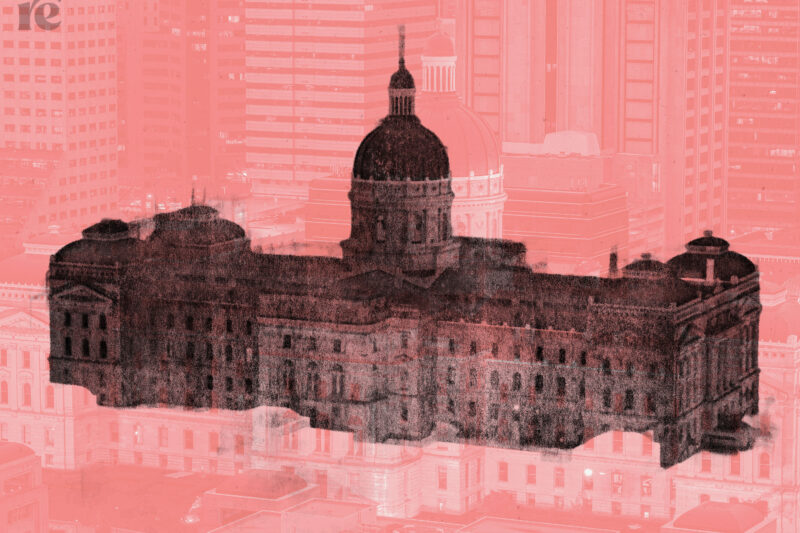Indiana Now Has a Religious Right to Abortion
How the conservative win from the 2014 Hobby Lobby decision was used to protect pro-abortion religious beliefs in Indiana.

Earlier this month, a three-judge panel of the Indiana Court of Appeals (which includes an appointee of anti-abortion Republican Gov. Eric Holcomb) unanimously affirmed a lower court ruling preventing the state from enforcing its near-total abortion ban on pregnant people whose faith could motivate them to get an abortion. This is the first state appellate court religious freedom and abortion decision since Dobbs v. Jackson Women’s Health Organization, and it could be persuasive in similar cases in other states. While courts have long recognized anti-abortion religious claims, this decision from Indiana reveals that those precedents are now available to those asserting their pro-abortion religious beliefs.
Just one month after Indiana passed its draconian abortion ban in 2022, five anonymous women of varying faiths—Jewish, Muslim, and spiritual-but-not-religious—and the grassroots organization Hoosier Jews for Choice, challenged the law in Indiana state court. They alleged that the ban violated their religious liberty rights under Indiana’s Religious Freedom Restoration Act (RFRA), the controversial law then-Gov. Mike Pence signed in 2015. By preventing them from accessing abortion in situations where their religious beliefs motivated them to do so, the ban infringed on the women’s religious beliefs and practices.
In December 2022, a state trial court granted a preliminary injunction preventing the ban’s enforcement until the court ruled on the merits of the plaintiffs’ claims. Later, the trial court also certified the case as a class action, meaning that all pregnant people who need abortions for religious reasons—not just the plaintiffs in the suit—are protected by the injunction. The state appealed both trial court holdings, and that appeal was the subject of the April 4 order.
It will be difficult for the Indiana Supreme Court to overturn this case on the merits. The same is true for the state courts adjudicating pending cases asserting a religious right to abortion in Wyoming, Kentucky, and Utah.
In upholding the injunction, the Indiana Court of Appeals propelled free exercise claims to abortion access. But the decision should not be surprising. The order straightforwardly applies the standard religious exemption test as it has been developed in hundreds of cases brought by conservative Christian law firms; a believer is entitled to a religious exemption from a law that substantially burdens their “sincere religious exercise” unless the state can prove that the burden is the “least restrictive means” of achieving a compelling government interest.
Even under Indiana RFRA’s robust protections for religious exercise, the state can limit people of faith’s religious freedoms when pursuing “compelling” state aims. But Indiana’s abortion ban did not pass muster. Because the ban has exceptions that allow some abortions and in vitro fertilization (IVF), the court reasoned, Indiana’s alleged interest in protecting fetal life must not be that “compelling.” And when the judges asked the attorney representing Indiana why the law’s existing exceptions would not undermine the state’s asserted goal of “protecting the zygote, embryo, or fetus”—but an exception for religious exercise would—the state could not explain.
There is no way to argue that an exemption to permit a religiously motivated abortion is “more dangerous” to the government’s asserted interest in fetal life than exemptions for pregnancies that pose a risk to the health of the pregnant person or that are the result of rape or incest.
The underinclusivity of Indiana’s efforts to protect fetal life was also fatal to the state’s argument that preventing the plaintiffs from accessing abortions was “the least restrictive means” of safeguarding its stated interest in fetal life.
There is a direct line between this reasoning and pandemic-era orders granting exemptions from quarantine regulations for religious organizations and gatherings. While the Supreme Court initially upheld state public health measures limiting religious gatherings, once Justice Amy Coney Barrett joined the Court, religious exemption law entered a new era—the government’s ability to deny an exemption to a religious entity became suspect if the law at issue contained any other exemption. In Tandon v. Newsom, for example, the Supreme Court held that California had to permit indoor religious gatherings because certain businesses such as hairdressers and restaurants were exempt from COVID-19 restrictions. To be clear, exceptions to state abortion bans are uniformly narrow and difficult to implement. But under the Tandon rule, their existence on the books means that exceptions for religiously motivated abortions must exist, too.
Supporters of those precedents are no doubt aghast at this decision, but, like all constitutional rights, the right to religious liberty must be granted in a neutral way. This commitment to neutrality is also visible in the Court of Appeals’ conclusion that abortion can be a religious practice. Though government attorneys typically exercise deference toward a plaintiff’s account of their religious practices as religious, Indiana asserted in its appeal that abortion could not be a religious exercise. Invoking the Supreme Court’s notorious 2014 Burwell v. Hobby Lobby decision—which granted corporations an RFRA exemption from the contraceptive coverage mandate of the Affordable Care Act—Indiana’s court dismissed the state’s argument that abortion is not a religious exercise, holding “if a corporation can engage in a religious exercise by refusing to provide abortifacients … a pregnant person can engage in a religious exercise by pursuing an abortion.”
Indiana will almost certainly appeal the court’s order, but it will be difficult for the Indiana Supreme Court to overturn this case on the merits. The same is true for the state courts adjudicating pending cases asserting a religious right to abortion in Wyoming, Kentucky, and Utah. Courts cannot venerate anti-abortion religious beliefs while rejecting the sincerely held pro-abortion beliefs of pregnant people. Not only would it be hypocritical, it would be unconstitutional. Favoring the religious beliefs and practices of some over others undermines free exercise rights and violates the prohibition against government favoritism of religion.

